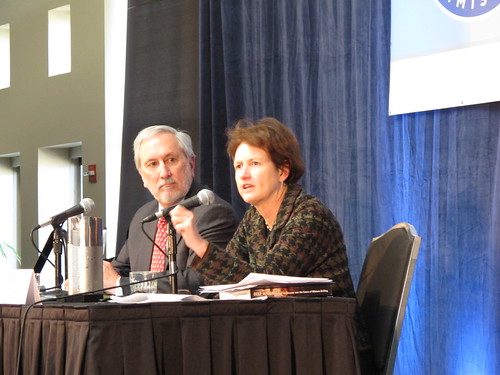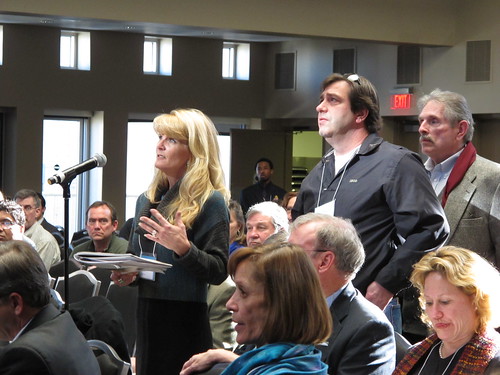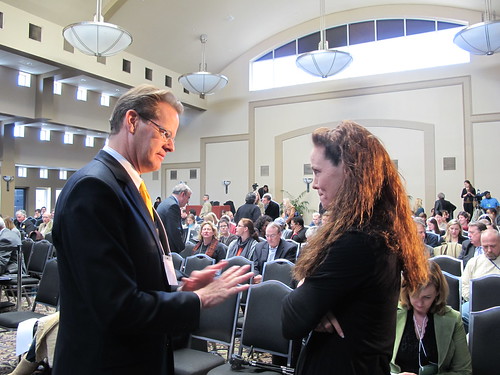Gulf Residents to Oil Industry and Government: Our Health is Not a Tradeoff
Yesterday, an icy wind whipped through the French Quarter. But inside the New Orleans Sheraton, the atmosphere was hot.
That’s where 250 people gathered to attend a forum sponsored by the National Commission on the BP Deepwater Horizon Oil Spill. Appointed by President Obama, it had just released its final report after a six-month investigation into the nation’s worst oil disaster in history.
People in the Gulf were anxious to sound off about their anger, frustration and flat-out despair about the way the oil industry and the government had handled the cleanup response and compensation for the millions of people impacted by the ongoing disaster.
Commissioners Frances Beinecke and Don Boesch prevailed over the bad weather in Washington and made the trip to the Big Easy. The audience was largely receptive to their report, which recommended an extensive overhaul of the oil industry’s failed safety practices in the Gulf and the creation of new independent agency to monitor offshore oil drilling activity.

Photos by Rocky Kistner/NRDC
Commissioner Don Boesch, president of the University of Maryland’s Center for Environmental Science, said the government had done little to advance research and response to major oil spills since the Exxon Valdez disaster in 1990. “Like an Army fighting the last war, we’ve failed to pay attention to the risk of oil drilling in deep water,” he said.
Commissioner Frances Beinecke, president of NRDC, told the crowd that the report had found a “systemic problem” and explained this oil spill was not an isolated incident. She stressed the commission’s finding that the government should form an independent agency to monitor and police the oil industry as the nuclear industry is regulated. And she called for an increase in the oil industry’s $75 million liability cap, as well as industry funding for increased government oversight.
In an audience of environmentalists, fishermen, and community activists, the acknowledgment of a widespread oil industry problem and recommendations that lead us in the right direction were welcomed. But there was pent up emotion over the health problems caused by the oil disaster that many in the audience felt were being ignored by the government. These are problems the commission agreed needed to be addressed.
Robin Young, who founded an Orange Beach, AL, citizens group Guardians of the Gulf, asked “What’s the sense of urgency about the health effects of our communities? The health studies are inadequate? What can we do?”

James “Catfish” Miller, a commercial fisherman from Mississippi, complained of ongoing health problems and difficulty paying his medical bills after his work on the BP cleanup program. “Who’s going to pay my hospital bills? My life is not a tradeoff.”
Kindra Arnesen, a community health activist and fisherman’s wife from Venice, LA, also worried about seafood safety and regaining the nation’s trust in commercial fishing in the Gulf. “Our brand is tainted. We need to do more testing for chemicals to regain integrity in our seafood. The proper assessment is not being done.”
And Tom Costanza of Catholic Charities in the New Orleans area voiced concern that the region is in the middle of a social service crisis and faced a claims process fraught with problems. “People call me crying and dying,” he said. “They need medical attention and support to get through this.”
The commissioners heard the audience loud and clear. Their report recommends that EPA develop better plans and procedures to address human health impacts of this kind. But after listening to the heart-wrenching stories, the commissioners vowed to pass them on to the man who makes the ultimate decisions. “We hear what you are saying,” said Frances Beinecke. “We will take these health issues and concerns back to the President.”
When the meeting was over, people left wondering what would come next. Would the government’s attention to their problems completely disappear? Would the Gulf fully recover from this unprecedented oil assault? Would they get adequate compensation for damages to their health and businesses?

The oil commission finished its job to investigate the failings and dangers of an over-zealous and poorly regulated oil industry. Now it’s time for Congress to act and to implement the commission’s recommendations to help ensure the oil industry never puts the health and safety of an entire region at risk in the future.
Given the makeup of the new Congress, that may be a tall order. But the people who attended this meeting and who are struggling to survive the BP oil disaster know there isn’t much of a choice. Our oil-based economy is inherently dangerous and unhealthy and we need to quickly transition to a more sustainable clean energy world. The still-unfolding tragedy in the Gulf can’t make it any clearer.
